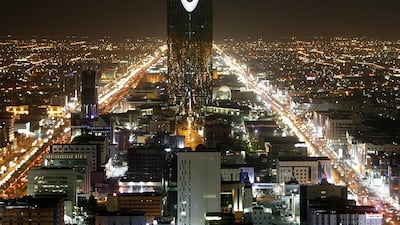Saudi Arabia will not wind down stimulus measures taken to minimise Covid-19's impact on its economy until it sees positive growth, its central bank governor said.
The regulator has “renewed many of these programmes recently” and will continue to support the kingdom’s economy, Fahad Al Mubarak told an online event on the sidelines of the International Monetary Fund and the World Bank's annual spring meeting on Tuesday.
“We don’t think it is wise to prematurely withdraw from these programmes, until we see actual recovery,” Mr Al Mubarak said.
Saudi Arabia, the biggest Arab economy, launched fiscal and monetary support packages in 2020 to soften the impact of the pandemic on its economy. The relief measures were aimed at protecting banks and businesses, especially micro, small and medium-sized enterprises, during the global economic slowdown.
In June last year, the Saudi Central Bank injected 50 billion riyals ($13.3bn) into its banking sector to boost liquidity and the lending capacity of financial institutions. It provided another 50bn riyals to shore up its private sector and launched concessionary finance for SMEs of up to 13.2bn riyals and loan guarantees worth 6bn riyals.
Under its Private Sector Financing Support Programme, the regulator extended about 30bn riyals to banks and financing companies to allow SMEs to postpone repayment of loans.
“This altogether has cost about $74bn that we were very happy to offer to the economy,” Mr Al Mubarak said.
“These programmes together have worked very well and have been very effective in minimising the damage on economic activity, especially for SMEs.”
Last month, the central bank extended its deferred payment programme for the private sector for an additional three months until June 30. It also extended its Guaranteed Financing Programme for another year until March 2022 to continue supporting small businesses, it said in a statement.
The loan deferral programme has so far benefited around 99,000 contracts with a total value of 124bn riyals. These relief measures are “consistent with the Saudi Central Bank's mandate of maintaining monetary stability, promoting financial sector stability and supporting economic growth", it said at the time.
Mr Al Mubarak now expects “positive” economic recovery this year in Saudi Arabia, partly on the back of a recovery in oil prices.
Additional “indicators of economic activities and stability of oil prices, thanks to Opec+, which Saudi Arabia is leading” are also supportive of positive economic momentum in 2021, he said without, giving an economic growth forecast for the year.
The IMF expects the kingdom’s economy to expand 2.9 per cent this year after shrinking 4.1 per cent last year.
Last week, the Opec+ group of oil producers agreed to gradually ease current output cuts. The group plans to add 2 million barrels per day back to the market over the next three months, with a view to rolling back a quarter of the production cuts agreed upon a year ago in response to the pandemic.
“We are sacrificing a little bit in the production. However, achieving stable oil prices is good for Saudi Arabia, for producers, consumers and for the region,” Mr Al Mubarak said.


